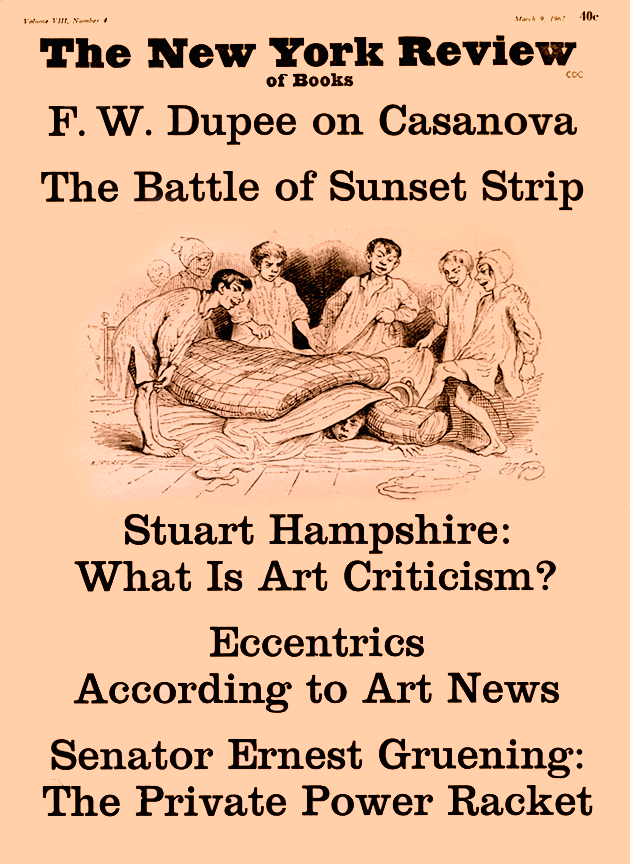In response to:
Cultivating the Enlightenment from the January 12, 1967 issue
To the Editors:
In his review of January 12, John Weightman laments that in Peter Gay’s The Englightenment: An Interpretation, The Rise of Modern Paganism, “there is nothing new or controversial.” His regret must be genuine, for he confesses to having a weakness for the Enlightenment; but his negative suggestion that we read Professor Gay, “I do not wish to put anyone off reading this book,” cannot be taken too seriously: he insists that we can find all that is new in Gay, in existing scholarship, for example in Hazard.
There is indeed nothing new in Professor Gay’s propositions as Mr. Weightman presents them, and, unhappily, Mr. Weightman’s presentation sets the irresponsible tone for the entire review. It is hardly surprising that he fails to contrast Professor Gay’s approach to that of the late Ernst Cassirer, to whose brilliant work Professor Gay acknowledges a profound debt. Much of what is new in Gay is precisely the application of Cassirer’s philosophy to the history of the Enlightment, set in the background of earlier European history. Professor Gay has written the first book that places the work of the philosophes in the continuum of Western history, showing where it was derivative and where it signaled a break with the past. The Enlightment is, also, an essay in a new genre of intellectual history, which its author clearly defines. Of all this we learn nothing from Mr. Weightman.
There are other aspects of Mr. Weightman’s review perhaps even more disconcerting than his failure to discuss the historiographical importance of Professor Gay’s work. The commentary is careless and desultory, rambling from a top-heavy introduction (about one-third of the review) to confusing interjections which, without more explanation, seem absurd. For example, what shall we make of the suggestion that the mythopoetic tendency of the human mind “is perhaps the philosophes’ concept of original sin”; or, of the notion that Professor Gay might be posing as a Christian historian when he describes the Trahison des clercs of the eighteenth-century churchmen; or of the insinuation that the subtitle, The Rise of Modern Paganism, was chosen for its “numinous” effect? The idea that historical periods need more defense and less explanation also strikes me as strange. If Professor Gay tells us that he likes the Enlightenment, but prefers to inform us of what it was rather than write an apology, I think we are much wiser for that decision.
Despite his incoherence and his daydreaming, Mr. Weightman’s meaning is clear. He suggests that Professor Gay, in describing the Enlightenment as the fight against mythopoeic thinking, has himself created a myth that he might, as a historian, understand this battle. If Mr. Weightman believes that every man must have his myth, and that scholarship is elegant myth-making, then he must be open to the proposition that book reviews can also be myths. They do not have to be, I think, but in a time of non-students and anti-novel, the non-review was destined to appear. It is disappointing that it should come from an accomplished critic.
Victor Wexler
New York City
John Weightman replies:
Mr. Wexler obviously thinks that my review, in addition to its other defects, was disrespectful of Professor Gay’s merits as a scholar and a thinker. Can I repeat that I consider The Rise of Modern Paganism an impressively learned and lively book, to be warmly recommended both to students and the general public?
I agree that my introduction was top-heavy, but I was trying to chart various contemporary attitudes to the eighteenth century, before showing where Professor Gay fitted in. Perhaps my aside about original sin and the mythopoeic tendency could, with advantage. have been cut out. All I meant was that, in the view of the most representative philosophes, the basic weakness of human nature is that it creates untruth in the very act of trying to grasp truth.
On the main point, I remain unshaken. I cannot follow Mr. Wexler when he says that “Professor Gay has written the first book that places the work of the philosophes in the continuum of Western history.” The book is a vigorous reworking of familiar material, with personal emphases. It does not renew the problem of faith versus non-faith. Of course, I may be naïve in hoping that this problem will some day be renewed.
I notice that Mr. Wexler does not answer my criticism of the use of the word “paganism.” Also, it is wrong to say that I accused Professor Gay of “posing as a Christian historian.” I said I suspected him of falling unwittingly into the language of the Christian historian, and that this uncertainty of tone perhaps indicated some lack of control over the material.
This Issue
March 9, 1967


